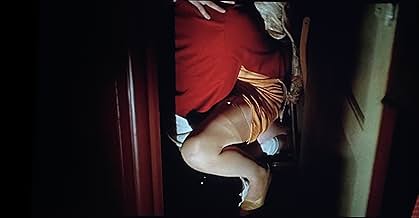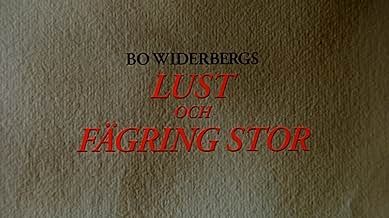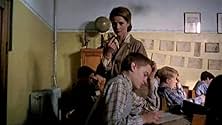Stig, a 15-year-old student, is attracted to the beauty of Viola, his 37-year-old teacher, and she, drawn to his youth and innocence, feels that he is a God-sent relief for her drunken and m... Read allStig, a 15-year-old student, is attracted to the beauty of Viola, his 37-year-old teacher, and she, drawn to his youth and innocence, feels that he is a God-sent relief for her drunken and miserable husband.Stig, a 15-year-old student, is attracted to the beauty of Viola, his 37-year-old teacher, and she, drawn to his youth and innocence, feels that he is a God-sent relief for her drunken and miserable husband.
- Nominated for 1 Oscar
- 6 wins & 7 nominations total
- Director
- Writer
- All cast & crew
- Production, box office & more at IMDbPro
6.88.4K
1
2
3
4
5
6
7
8
9
10
Featured reviews
a surprise
I caught this film on Canadian television, and I was startled by the risque content being broadcast on a non-pay station. This is a story of a growing adolescent boy in a war-torn Europe. The focus of the movie is in the complex relationships he holds with the people in his life. The controversial nature may deter the more conservative American; however, the characters are well-rounded and acted and the cinematography is superb. I have a feeling this director may be famous in his home country, there is a touch of epic brilliance in the movement of the scenes.
Something lacking, something unsaid
This was to be director Widerberg's last movie. A sweet family farewell, since his son played the lead in it. What his last words may be, as expressed in this movie, though, is hard to say. There is no clear moral in it, for which I am thankful, but a somewhat distressing observation about love: it is a close neighbor to hate, and it will not leave without vengeance.
The love affair between the school teacher and the teenage student is interesting when it starts to break up, but its beginning is too swiftly dealt with to make any sense, and its joyous, lustful phase is without depth. Only when things go awry, does the story get interesting, and the actors get to excel in their art.
The title is from a psalm, which is traditionally sung by students when they leave school for the summer break - or for good. It's a hymn to the summer and its luscious splendor - therefore, a lust of another kind, than the carnal one the movie deals with. Some Widerberg irony, no doubt.
Using his son as the student in the movie, was not that good an idea, although Johan Widerberg has a rare charisma on screen, and his own odd talent in acting. His father seems not to have been able to treat his son with the same merciless exploitation, as he was quite apt to do with other actors. So, the student is left hanging in a kind of vacuum, as if empty of his own intentions and conflicts. Things happen to him, as if he had nothing to do with them.
In this type of drama, it is important that the characters are stripped naked - well, mainly their souls, but bodies too, if need be. Widerberg manages the latter with his son, briefly, but not at all the former. When wanting to protect his son, he actually abandons him - for no other reason than the inhibitions in his own fatherhood. Johan, on the other hand, seems to be prepared to do any sacrifice necessary, to make the movie work.
I could be wrong. But the impression remains: the student's story never really gets to be told, because he is not allowed to be present, completely.
The love affair between the school teacher and the teenage student is interesting when it starts to break up, but its beginning is too swiftly dealt with to make any sense, and its joyous, lustful phase is without depth. Only when things go awry, does the story get interesting, and the actors get to excel in their art.
The title is from a psalm, which is traditionally sung by students when they leave school for the summer break - or for good. It's a hymn to the summer and its luscious splendor - therefore, a lust of another kind, than the carnal one the movie deals with. Some Widerberg irony, no doubt.
Using his son as the student in the movie, was not that good an idea, although Johan Widerberg has a rare charisma on screen, and his own odd talent in acting. His father seems not to have been able to treat his son with the same merciless exploitation, as he was quite apt to do with other actors. So, the student is left hanging in a kind of vacuum, as if empty of his own intentions and conflicts. Things happen to him, as if he had nothing to do with them.
In this type of drama, it is important that the characters are stripped naked - well, mainly their souls, but bodies too, if need be. Widerberg manages the latter with his son, briefly, but not at all the former. When wanting to protect his son, he actually abandons him - for no other reason than the inhibitions in his own fatherhood. Johan, on the other hand, seems to be prepared to do any sacrifice necessary, to make the movie work.
I could be wrong. But the impression remains: the student's story never really gets to be told, because he is not allowed to be present, completely.
More films of this standard are desirable
How much I regret the passing of director Bo Widerberg who can create a film such as this one with its dramatic portrayal of human problems, human relationships and human emotions. It was not so much the dialogue but more the unspoken words that grabbed my attention and held me to the end. A long silence can be filled with meaning....a stolen look, a fleeting glance, a flicker of a smile, a movement of the eye....all these subtle messages electrify the air between Viola the teacher and Stig the student in the class room. We know at once that in some magical way their lives have been drawn together and as we are caught up in the drama we seem to know that eventually the ending will not be a happy one.
Under the guise of having special coaching lessons, Stig gains entrance into his married teacher's household after his evening cinema job. Shy at first he soon experiences the delights of a continuing relationship with Viola who is a very competent teacher in all respects. Perhaps we can pardon Viola for her "cradle snatching" when we find out that her husband has taken to drink and seems almost permanently drunk.
The love scenes are sensitively handled and the remarkable changes which develop in the characters create an imposing piece of cinema. Stig seems to take on a degree of security in a scene where he accuses the husband of the impossible situation. But who is really to blame? That is the intriguing part of the film.
There are some aspects that are not explained thus the viewer becomes involved. As for the stolen encyclopaedia, why would Stig carry them off. Is he just in a vindictive mood and does it just to annoy Viola or have those volumes become special to him because they belonged to Viola.
Under the guise of having special coaching lessons, Stig gains entrance into his married teacher's household after his evening cinema job. Shy at first he soon experiences the delights of a continuing relationship with Viola who is a very competent teacher in all respects. Perhaps we can pardon Viola for her "cradle snatching" when we find out that her husband has taken to drink and seems almost permanently drunk.
The love scenes are sensitively handled and the remarkable changes which develop in the characters create an imposing piece of cinema. Stig seems to take on a degree of security in a scene where he accuses the husband of the impossible situation. But who is really to blame? That is the intriguing part of the film.
There are some aspects that are not explained thus the viewer becomes involved. As for the stolen encyclopaedia, why would Stig carry them off. Is he just in a vindictive mood and does it just to annoy Viola or have those volumes become special to him because they belonged to Viola.
To be young and in love with your teacher!
This is the life most men wish they had - an affair with their teacher. But all were not so pretty as the one in here. It's a coming of age story set in a time when men were going off to die in wars and those left behind were trying to make sense of it all in a society that was slowly crumbling. More complicated than now but still relevant in today's youth. All handled brilliantly by the Swedish director, Bo Widerberg, who loves to tell his tales in sensual lighting and locations. He sometimes tends to go soapy but held it in line for hi last work of art. Hewas to pass away a couple of years later. But he left us with another tender story for the soul.
Bo Widerberg passes cinema baton to his son
Bo Widerberg was honored in February 1997 at the Miami Film Festival with a retrospective (ELVIRA MADIGAN), and his latest (last?) film, the Oscar nominated ALL THINGS FAIR. I then saw ALL THINGS FAIR for the second time, and despite its length, enjoyed it as much or more than the first time I saw it in an arthouse theatre in Toronto. I think ALL THINGS FAIR is the great Swedish director's best, most personal film. You can't help but notice it must be autobiographical by the passion and the vivid recreation of WW II Sweden, as it was when Mr. Wideberg himself was the lead character's age. Speaking of him, the lead is the director's own 17 year old son, Johan Widerberg, who will undoubtedly carry on the family tradition in Swedish cinema history. Mr. Widerberg (Sr.) passed away last year, and among his legacy, this film stands out. It is a rare coming of age story in a setting seldom depicted on screen. Mr. Wideberg's screenplay, and direction, plus excellent performances by his son and two of Sweden's greats, Marika Lagerkrantz and Tomas van Bromssen make this a movie every European film buff should watch. It's now available on video. Check it out.
Did you know
- TriviaKarin Huldt was 14 during filming.
- GoofsRCA Red Seal records are shown playing on the phonograph nearly every time Stig and Kjell are listening to classical music, and when Stig is listening to a classical recording at his home; none of the pieces on the soundtrack were RCA recordings.
- ConnectionsFeatured in Lust och fägring - En film om Bo Widerbergs sista (2015)
- SoundtracksRinaldo: Lascia ch'io pianga
Music by George Frideric Handel (as Händel)
Performed by Lesley Garrett with The Philharmonia Orchestra
Conducted by Ivor Bolton
Silva Screen Records (UK)
- How long is All Things Fair?Powered by Alexa
Details
- Release date
- Countries of origin
- Languages
- Also known as
- La belleza de las cosas
- Filming locations
- Production companies
- See more company credits at IMDbPro
Box office
- Budget
- DKK 25,000,000 (estimated)
- Gross US & Canada
- $13,128
- Opening weekend US & Canada
- $4,530
- Mar 10, 1996
- Gross worldwide
- $13,128
Contribute to this page
Suggest an edit or add missing content





























